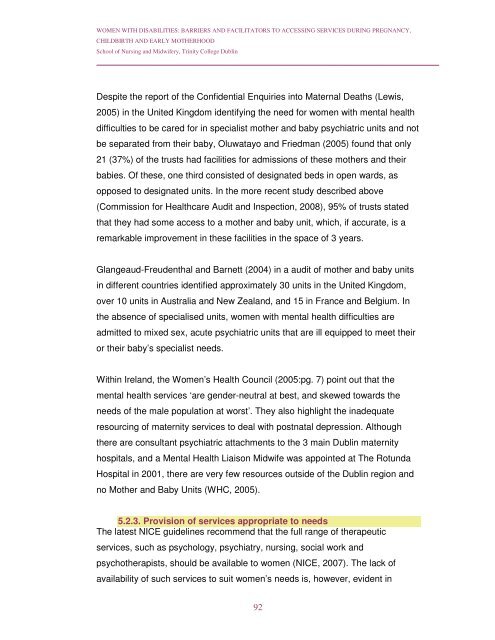Women with Disabilities: Barriers and Facilitators to Accessing ...
Women with Disabilities: Barriers and Facilitators to Accessing ...
Women with Disabilities: Barriers and Facilitators to Accessing ...
You also want an ePaper? Increase the reach of your titles
YUMPU automatically turns print PDFs into web optimized ePapers that Google loves.
WOMEN WITH DISABILITIES: BARRIERS AND FACILITATORS TO ACCESSING SERVICES DURING PREGNANCY,CHILDBIRTH AND EARLY MOTHERHOODSchool of Nursing <strong>and</strong> Midwifery, Trinity College DublinDespite the report of the Confidential Enquiries in<strong>to</strong> Maternal Deaths (Lewis,2005) in the United Kingdom identifying the need for women <strong>with</strong> mental healthdifficulties <strong>to</strong> be cared for in specialist mother <strong>and</strong> baby psychiatric units <strong>and</strong> notbe separated from their baby, Oluwatayo <strong>and</strong> Friedman (2005) found that only21 (37%) of the trusts had facilities for admissions of these mothers <strong>and</strong> theirbabies. Of these, one third consisted of designated beds in open wards, asopposed <strong>to</strong> designated units. In the more recent study described above(Commission for Healthcare Audit <strong>and</strong> Inspection, 2008), 95% of trusts statedthat they had some access <strong>to</strong> a mother <strong>and</strong> baby unit, which, if accurate, is aremarkable improvement in these facilities in the space of 3 years.Glangeaud-Freudenthal <strong>and</strong> Barnett (2004) in a audit of mother <strong>and</strong> baby unitsin different countries identified approximately 30 units in the United Kingdom,over 10 units in Australia <strong>and</strong> New Zeal<strong>and</strong>, <strong>and</strong> 15 in France <strong>and</strong> Belgium. Inthe absence of specialised units, women <strong>with</strong> mental health difficulties areadmitted <strong>to</strong> mixed sex, acute psychiatric units that are ill equipped <strong>to</strong> meet theiror their baby’s specialist needs.Within Irel<strong>and</strong>, the <strong>Women</strong>’s Health Council (2005:pg. 7) point out that themental health services ‘are gender-neutral at best, <strong>and</strong> skewed <strong>to</strong>wards theneeds of the male population at worst’. They also highlight the inadequateresourcing of maternity services <strong>to</strong> deal <strong>with</strong> postnatal depression. Althoughthere are consultant psychiatric attachments <strong>to</strong> the 3 main Dublin maternityhospitals, <strong>and</strong> a Mental Health Liaison Midwife was appointed at The RotundaHospital in 2001, there are very few resources outside of the Dublin region <strong>and</strong>no Mother <strong>and</strong> Baby Units (WHC, 2005).5.2.3. Provision of services appropriate <strong>to</strong> needsThe latest NICE guidelines recommend that the full range of therapeuticservices, such as psychology, psychiatry, nursing, social work <strong>and</strong>psychotherapists, should be available <strong>to</strong> women (NICE, 2007). The lack ofavailability of such services <strong>to</strong> suit women’s needs is, however, evident in92
















